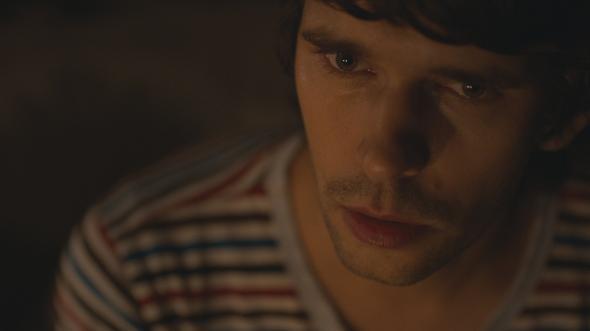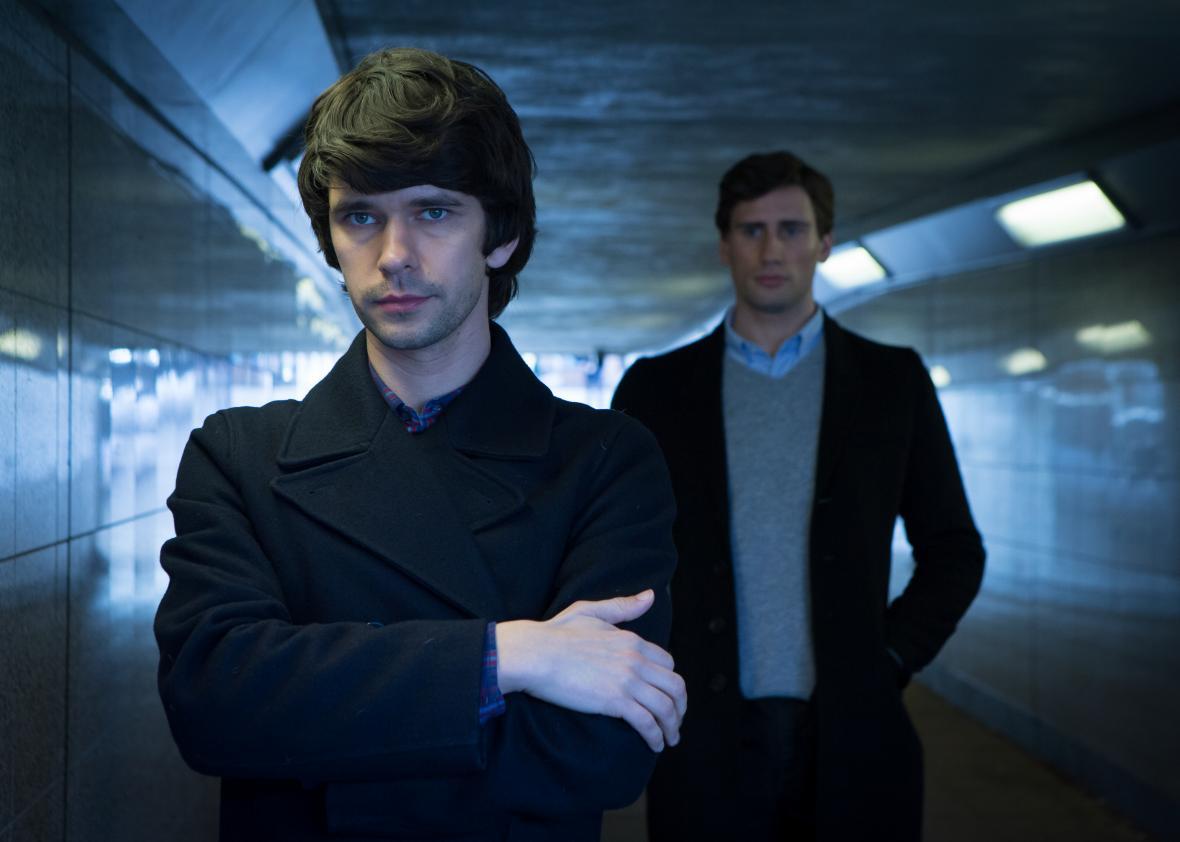London Spy, which premieres on BBC America on Thursday, Jan. 21, is the story of Danny Holt (Ben Whishaw), a young gay man who falls in love with a stranger and suddenly finds himself in the middle of a high-profile mystery involving the security services, the Fleet Street press, his friend and former spy Scottie (Jim Broadbent), and his lover’s mother, played with extraordinary restraint by Charlotte Rampling.
I spoke with the show’s creator, Tom Rob Smith, about how the show came into being, why the central characters had to be gay, and what it’s like to work with Ben Whishaw.
Despite the title, it felt to me like London Spy was really about Danny’s transformation from a lost party boy to a self-actualized, potentially successful guy.
I think you’re right, it’s a growing up story, that’s the story of the series more than anything else.
For all these transformations, you have a sense that there was always something in Danny, even before he met Alex, an instinctive talent for spycraft. And it feels like it’s related to his being gay, that sense of constantly looking for signals and of being surveilled and judged. He’s used to having to hide things from people. For so long gay people were excluded from the security services, whereas being gay might be a better indication that you’d be a good spy than being good at math or crossword puzzles.
There was a history of famous gay spies in England. Traitors. If you grow up knowing that if your sexuality is exposed, you’ll be disgraced, that you’ll have no place in your society, what happens is that your link to that world is cut at an early age. It’s not that you are somehow intrinsically more likely to be a spy, it’s that your country is saying, “We don’t want you.” So of course they might gravitate to other countries. Communism held up this—as we now know, false—notion that somehow everyone was going to be equal. It’s now this huge irony that the West has gay marriage and equality, and Moscow has gone back in time to prejudice and intolerance. So spies left the world that was going to change for a world that actually was going to be oppressive. Who knows whether these people were born spies, or if they were made spies by their country.
I also wanted to address this notion that somehow being gay makes you intrinsically less reliable, which was, I guess, the premise of the ban on being gay at MI6, which was in force until the late ‘90s. In [Danny’s boyfriend] Alex, you have someone obsessed with truth. I think an obsession with authenticity comes from someone who’s told so many lies.
You also show, with the way the press blows up stories of sexual scandal and the way HIV stigma comes into it, that even today in supposedly tolerant, accepting nations, it’s much easier to discredit a gay person.
It had to be a gay story. When the press blows up the sexual scandal, they’re attacking Danny’s love story. It’s not just that he loses his lover, he loses the perfect love story that he had, because it’s lied about. When he says he didn’t do these things, he’s not objecting to it from a moral point of view. He’s not saying, “I’m appalled by that.” He’s saying, “This wasn’t our story. You’re attacking our story because you know that will distract people from the truth.”
I really enjoyed Danny’s relationship with Scottie, partly because Scottie is a great character, but also for the mentorship that may be a little less important these days but has been a traditional part of gay life: You learn about gay history form older gay people.
There’s a subtle sexual element to it, but it was never meant to be acted upon. Even Scottie doesn’t actually want that. He understands that their love is separated by 40 years, that they would’ve been perfect for each other had that gap not existed, but they both accept that gap. It’s a friendship that has an intensity to it. When Danny falls in love with Alex, Scottie sees in Alex himself as a younger man, and he’s thrilled for Danny, but at the same time he’s like, “I wish I could’ve had that.” Scottie feels like, growing up, That was stolen from me. Now we’re living in a world where you have opportunities that I didn’t have. I think that’s partly the wistfulness that comes into it.
It’s also a very romantic story. You almost have a sense Danny’s falling in love for the first time.
I think he’s falling in love for the first time in a real way. I think he falls in love a lot, and I think he creates narratives. He’s desperate to have a love story, and so you create narratives around people. I think that was his background. He keeps meeting people and thinking, “This is going to be it,” and it not being it. It’s not that he’s promiscuous for the sake of it. I think each time he believed it, and then it evaporated, and he was like, “Well, I need to believe it with someone else.” I think it was always, for Danny, an act of romance, but after a certain time you think, “Is it ever going to convert into reality?” I think that’s what’s surprising about him, he goes out there thinking, “I’m never going to give up.” That’s what I love about him: Even though he’s had many failed relationships, he believes that the one is out there.

Photo ©WTTV Ltd., courtesy of BBC America
Was Ben Whishaw always involved? Did you write the show for him?
In my head he was, but what happened is after [I’d written] three episodes, I thought, “This is distracting. I know that I’d love Ben to play it, but I don’t know him. I don’t know if he’s even remotely interested.” So, I said, “OK, let’s just send it to Ben and see what happens.” He said yes after episode 3, which is very unusual. So he was Danny from an early stage, and then I rewrote everything with him in mind and thought, “I can now do anything because it’s him.” So he’s very much in the DNA of the piece.
And he’s in almost every scene.
Yeah, the whole show depended upon him. There’s one moment in episode 2, where he’s talking to the mirror. I was on set watching him. I thought, “This is just phenomenal.” It’s just watching someone go through this range of emotions in 10 seconds. When you put it together on TV, because you’re editing, it almost takes away some of the brilliance, because people instantly think this is a collage of different takes, but it was one take. He did it all in one fluid mass, and I wish I could have taken over the audience and said, “There’s no editing, there’s no trickery. It’s him. He’s brilliant.
I hope he gets everything he deserves. I’d love to do more for him. I just don’t know whether Danny going on would be right for him. The BBC would love to do it …
It doesn’t seem like you’re terribly driven to extend Danny’s story, though.
I love returning series, I don’t have any issue with that, I just think you have to conceive it that way from the beginning, I don’t think you can think, “Oh, it was a success, now let me think about it.” I didn’t conceive it that way at the beginning. In my head I saw the shape of his story, and I didn’t see it carry on.
London Spy was a take on Danny being very young and innocent and going on a journey with him where he grows up. Now we’ve done that journey. At the end of episode 5, he’s moving into the real world of espionage. I was never that interested in that world, I was interested in his relationships.
I imagine that a few years ago the difficult part of selling this project would be the gay content. Now I suspect the hard part might be the security services stuff, because the picture that you paint is of an omnipotent, completely controlling, over-power. Did you have any pushback about that?
No. Not at the BBC, it never came up for a single second. They never said anything, never asked any questions which triggered some bell in my head. They were amazing. They were the best champions of the piece and supported the piece all the way through. Growing up, I wasn’t out. If you had told me that at 33, 34, I would start writing this, and it would be commissioned, and I’d be supported by a great channel, and I’d not experience any prejudice—in fact, only experience the most wonderful, creative relationship—I would’ve thought it was just impossible to believe. In a real sense, the world has changed.
This interview has been edited and condensed.
